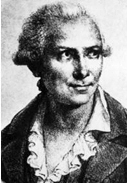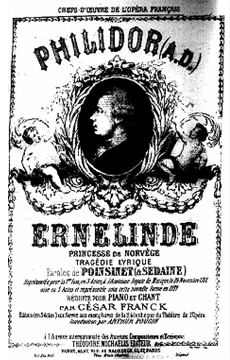Philidor François-Andre Danican (07.09.1726 – 31.08.1795)
 Philidor was born in Dreux near Versailles, France. He started playing chess when he was 10 and was then trained by Sire de Legall another strong French player of that time. In 1744 Philidor played two chess games blindfolded simultaneously in public in Paris. He said he had learned how to do this when he could not sleep at night and played chess without seeing a board. This was the first time that blindfolded play against two opponents was recorded.
Philidor was born in Dreux near Versailles, France. He started playing chess when he was 10 and was then trained by Sire de Legall another strong French player of that time. In 1744 Philidor played two chess games blindfolded simultaneously in public in Paris. He said he had learned how to do this when he could not sleep at night and played chess without seeing a board. This was the first time that blindfolded play against two opponents was recorded.
Philidor played chess with Voltaire and Jean-Jacques Rousseau, both persistent but weak chess players. In 1745, He went to Rotterdam and then to London accompanying a music company. Due to the unexpected cancellation of the concerts, his focus shifted to chess to earn a living. During 1747, he played a 10-game match with Phillip Stamma, one of the strongest players of his time. He gave him odds of a move and the drawn game would count as a win for Stamma. Philidor trounced Stamma with a score of 8 wins; 1 draw and 1 loss.
By 1750 Philidor was considered the strongest player in France, England, and the Netherlands.He left England for Prussia, giving an exhibition before King Frederick the Great at Potsdam. He then visited Berlin where he played three blindfolded games simultaneously, winning them all. He then returned to England. In November 1754 he returned to France after being gone for nine years. He started composing music again. He did not return to England until 1772.
In 1755 he beat Legal in a chess match at the Café de la Regence. In 1774 the Parsloe’s chess club was formed in London, with a distinguished membership limited to 100. A fund was raised to enable Philidor to spend from February to May at the club. Philidor visited the club as a resident master for 20 years. He gave lessons for a crown each.
On 27 May 1783 Philidor, played three blindfolded games simultaneously, winning two and drawing one. In December 1792, at the age of 65, he left France for England, never to return. His music was banned from France after the French Revolution for political reasons. In 1795 he published the third edition of his book, dedicating it to his friend and patron, Count Bruhl. Philidor’s last blindfolded performance was on 20 June 20, 1795, at the London chess club. On 31 August 1795, at age 68, he died in London. Only 68 games from his last years have been recorded, either played blindfolded or at odds. Philidor was in his 60s when the games were recorded. He wrote over 20 operas during his musical career.
Philidor’s chess book (1748) was the first chess book that organized the openings that explained the middlegame, the overall strategy of chess, and the importance of pawn formation. In his book, he made the observation that ‘Les pions sont l’ame du jeu’ (the pawns are the life of the game). His book was also the first to examine the R+B vs R endgame. It also had some analysis of 1.e4 e5 2.Nf3 d6, the Philidor’s Defence. Later, the books were translated into English and Russian. In 1777 he published the second edition of his book under the patronage of the London Chess Club at Parsloe’s. In this book, he described the r ule for castling as we know it now. Being a professional musician, Philidor alternated chess with his music profession all through his life. Philidor was far ahead of his days and his contemporaries never seem to have understood him and his concepts. He understood the importance of pawns, center, blockade, prophylaxis mobility, etc., hitherto unheard of in those days. He pronounced that the pawns are the soul of chess and through his games, he showed the ways to open lines for attack and close the line of attack for the opponent using pawns. Unfortunately, no record is available of Philidor’s games when he was at his peak and what little we now have is only those which he played in his sixties. He introduced chess in a big way in England and the elite British society formed a club named ‘Parsloe’s’ with the sole purpose of retaining Philidor with them. Philidor died on 31st August 1795 at the age of 68. The man who was the first one to approach chess in a scientific manner was rightly considered to be ‘the father of chess’. His opening – the Philidor’s defence – is still played even at the highest level is a testimony to his profound thinking brain. Philidor was a master analyst and before we proceed to see a few of his classic endings, let us see a game which was one of the three games he played simultaneously blindfolded, considered as an astounding feat at that time.
ule for castling as we know it now. Being a professional musician, Philidor alternated chess with his music profession all through his life. Philidor was far ahead of his days and his contemporaries never seem to have understood him and his concepts. He understood the importance of pawns, center, blockade, prophylaxis mobility, etc., hitherto unheard of in those days. He pronounced that the pawns are the soul of chess and through his games, he showed the ways to open lines for attack and close the line of attack for the opponent using pawns. Unfortunately, no record is available of Philidor’s games when he was at his peak and what little we now have is only those which he played in his sixties. He introduced chess in a big way in England and the elite British society formed a club named ‘Parsloe’s’ with the sole purpose of retaining Philidor with them. Philidor died on 31st August 1795 at the age of 68. The man who was the first one to approach chess in a scientific manner was rightly considered to be ‘the father of chess’. His opening – the Philidor’s defence – is still played even at the highest level is a testimony to his profound thinking brain. Philidor was a master analyst and before we proceed to see a few of his classic endings, let us see a game which was one of the three games he played simultaneously blindfolded, considered as an astounding feat at that time.



